USDOT Thriving Communities Program: Decatur, IL
20 minutes Date Launched/Enacted: Dec 4, 2024 Date Published: December 9, 2024
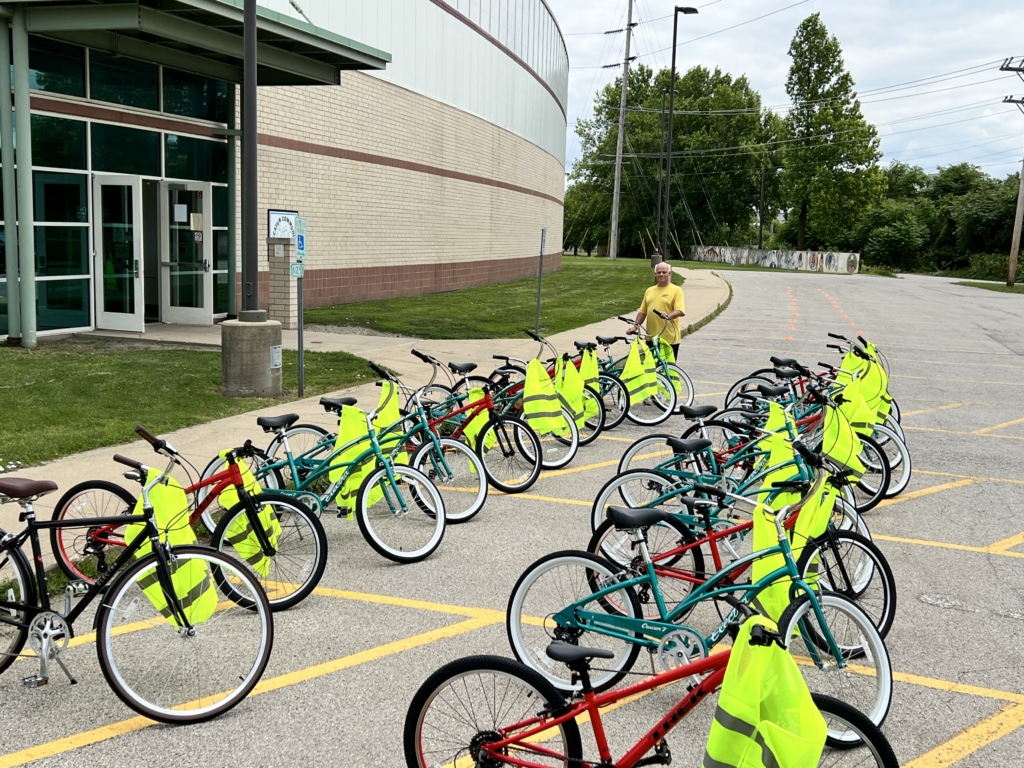
About the Thriving Communities Program
The Thriving Communities Program (TCP) funds tailored technical assistance to under-resourced and disadvantaged communities, helping them better access historic infrastructure investments and deliver transformative projects. The US Department Of Transportation (USDOT) FY 2022 Thriving Communities Program supports 64 communities across the country with access to a team of capacity builders to develop innovative community engagement methods, identify funding opportunities, and grow long-term capacity to develop and deliver transportation projects that strengthen communities.
TCP Complete Neighborhoods Community of Practice
TCP Communities are grouped into three Communities of Practice: Main Streets, Networked Communities, and Complete Neighborhoods. The 15 communities included under the Complete Neighborhoods Community of Practice are:
| Atlantic Beach, SC | Isabela, PR | Santa Cruz, CA |
| Billings, MT | Lansing, MI | St. Louis County, MO |
| Decatur, IL | Lima, OH | Suffolk, NY |
| East Orange, NJ | Providence, RI | Sumter, SC |
| Indianapolis, IN | Roanoke, VA | Waukegan, IL |
The US Department of Transportation (USDOT) selected a Capacity Building team led by RMI, including: the American Council for Energy-Efficient Economy (ACEEE), Equitable Cities, Nelson\Nygaard, and the Shared-Use Mobility Center (SUMC), to provide technical assistance to these 15 communities.

A Snapshot of Decatur, Illinois
Decatur, Illinois, is a Central Illinois city situated along the Sangamon River and Lake Decatur, roughly 40 miles from Springfield, the state’s capital. As the county seat (and largest city) of Macon County, Decatur has an estimated population of 66,594 in 2023 (2023, ACS 1-year). Decatur developed as a transportation and agricultural hub in the 19th century due to its strategic location along major railroads and the Sangamon River. Known for its grain processing industry, it became home to companies like Archer Daniels Midland (ADM) and A. E. Staley Manufacturing Company (now known as Primient—Primary Products Ingredients Americas LLC). However, today the service industry is the largest source of employment for Decatur residents, followed by the manufacturing industry and retail.
The median household income in Decatur is $46,564, significantly lower than Illinois’ median household income of $80,306. Roughly 21% of Decatur residents live below the Federal Poverty Line, over double the average rate in Illinois (11.6%). The median value of owner-occupied housing units in Decatur is presently $89,400, roughly one third of the Illinois median home value of $263,300. These figures combine to place Decatur as a low- to moderate-income community according to the USDOT Equitable Transportation Community (ETC) Explorer. Most Decatur residents drive alone to work, with an average commute time of 17.7 minutes and on average, households spend up to 49% of their income on transportation.
The City of Decatur has experienced a steady population decline since its peak of 94,081 residents in the 1980 census, when the Decatur Metro Area—coterminous with Macon County, Illinois—had a population of 131,375. Today, the city is home to 66,594 people with 100,591 in the Metro Area (ACS 2023 1-year). This downturn was shaped by economic and social challenges that left lasting scars on the community, similar to many small, midwestern cities.

Population Decline in the past decade in Decatur, Illinois.
Source: US Census Bureau
Notably, the city faced national scrutiny during the Ford-Firestone controversy, which tied the local Firestone tire plant to a high-profile transportation tragedy wherein hundreds of people around the country were injured or killed in crashes involving Ford Explorers and other light trucks. The Decatur Firestone plant closed in 2001 following many lawsuits between the two companies. This loss of manufacturing jobs led to even more residents leaving the area.
In the 2000 census, the population of Decatur measured 81,860 residents. The city has lost 18.6% of its population since then, while the metro area has declined by 12.3%. While the Ford-Firestone controversy drew negative attention to the city, Decatur’s city government continues to work toward revitalization and fostering new opportunities for its residents while positioning the region for growth in the future.
Key Initiative for Transportation: Jasper Street Great Streets Great Neighborhoods
Through TCP, Decatur is working towards advancing the City’s Great Streets, Great Neighborhoods Initiative, which is a program spearheaded by the Department of Economic and Community Development, encouraging Decatur’s residents and businesses to reimagine what their neighborhoods and corridors can be. Great Streets, Great Neighborhoods seeks to bridge the gap between potential and reality by engaging residents to implement strategies to enhance their communities.
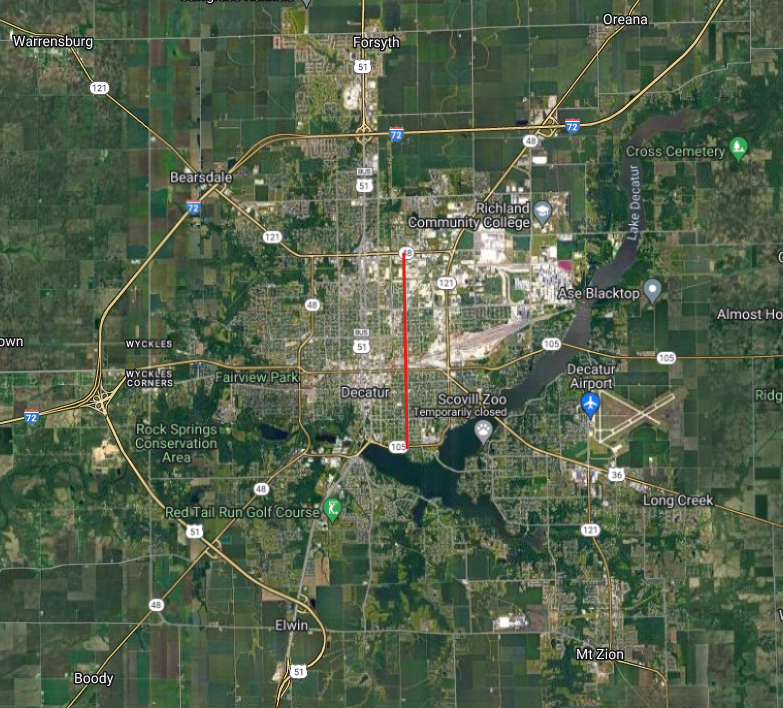
Satellite view of Decatur, Illinois with Jasper Street highlighted in red
Source: Google Maps
Jasper Street runs north-south, just east of the center of Decatur. The street connects many neighborhoods, land uses, and communities. Jasper Street is generally more industrial to the north and more residential to the south. There are schools, houses of worship, nonprofit organizations, locally-owned businesses, and homes along Jasper Street. Johns Hill Magnet School is a K-8 public school situated along Jasper Street. In 2021, it was rebuilt and the neighborhood around it saw reinvestment thanks to donations from the Howard Buffett Foundation and investments from the City of Decatur.
The Boys and Girls Club of Decatur serves children from across the city, situated just north of a viaduct, where the Norfolk Southern Railroad crosses overhead in the center of Jasper Street. This viaduct—adjacent to the defunct Wabash Railroad’s historic turntable—leads directly to Norfolk Southern’s Decatur Terminal to the East. The Hope Academy is a K-8 public school adjacent to the Boys and Girls Club that serves children from kindergarten to eighth grade. In short, Jasper Street is a connector which brings together many parts of the city. Decatur’s Department of Economic and Community Development is hoping to translate this central location into a distinct cultural identity which defines the Jasper corridor.
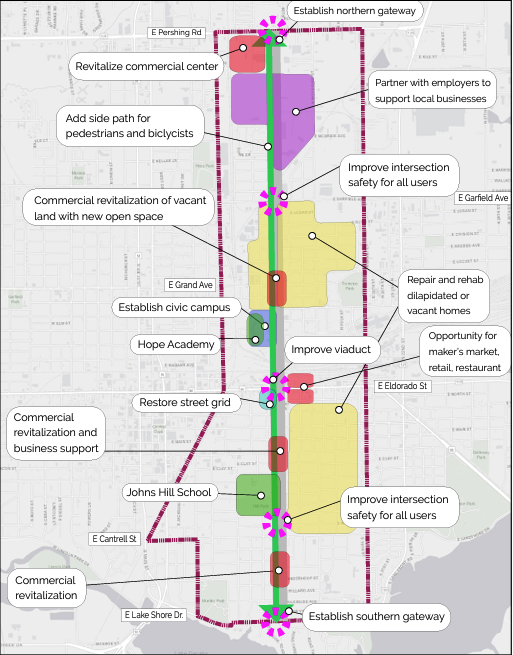
Map of Jasper Street, highlighting the planned interventions as outlined by Decatur’s Great Streets, Great Neighborhoods initiative. Image Credit: City of Decatur, Jasper Roadmap
The Great Streets, Great Neighborhoods initiative aims to bring a sense of cohesion, community, and identity to the City of Decatur. This broad brush initiative begins along the Jasper Street Corridor with the Jasper Roadmap, an estimated 3-year, $10 million plan which was passed by City Council in September of 2023. The Jasper Roadmap, developed by the City with support from their consultant Teska Associates, is designed to bring several neighborhoods together along the Jasper Street Corridor. The City engaged residents, businesses, and community leaders to learn from them what is needed along the Corridor to make this initiative successful.
Prior to passing the Roadmap, the City hosted multiple Jasper Street Fests to generate engagement in the corridor and gather public feedback on potential uses of public space. With the support of Teska Associates, Decatur gauged interest in recommendations including placemaking opportunities and potential programs in the area. The Roadmap outlines plans to improve transportation and street design which will accommodate all users. Additionally, the goals of the Roadmap include a potential addition of a civic plaza around the existing Boys and Girls Club and The Hope Academy. While the City Council passed this plan, the ongoing implementation will require leveraging millions of dollars in state and federal grants. Community engagement efforts stemming from the plan include consolidating community feedback from a needs assessment effort at the Jasper Street Fest, an online comment map, focus groups, and a steering committee. These engagement activities provided a comprehensive understanding of the community’s needs, guiding the development of Decatur’s Great Streets Great Neighborhoods initiatives. This needs assessment allowed Decatur representatives to gain deeper insights into ongoing projects, challenges, and partnerships within the community.
Key Partners
Decatur is working with several key partners on these initiatives. Some of these partners include:
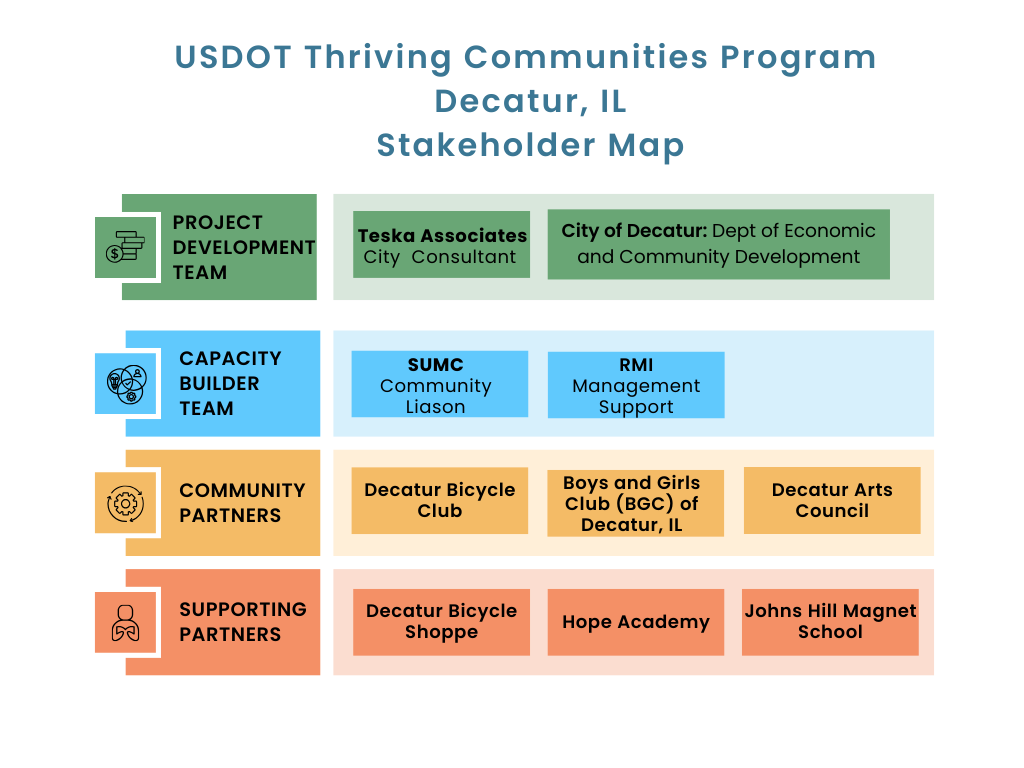
The role of the Capacity Building team is to leverage existing resources and community partners within the City of Decatur to grow local interest in the transportation programs and placemaking goals outlined in the Jasper Roadmap. This led to the creation of the Jasper Street Implementation Committee, which included all of the above groups, led by the Capacity Building team.
Activities through the Thriving Communities Program
Community Engagement
The TCP Capacity Building team contacted the city of Decatur officials to conduct a needs assessment. Participants discussed the city’s transportation needs that the program could support.
The Jasper Street Summer Fest in August, 2023, offered community members a chance to provide input on the Draft Roadmap for future Jasper Street initiatives focused on housing, transportation, placemaking, neighborhood development, and economic growth. The event drew over 300 Jasper Street residents, who enjoyed family-friendly activities like a bike rodeo, face painting, a bounce house, live music, and food from local food trucks.
Residents explored the new placemaking initiative at the Street Fest to transform outdoor spaces into safe, welcoming areas. Visitors voted on preferred improvements, expressing strong interest in flexible space upgrades, bike racks, and accessible exercise equipment for all, including those with disabilities. Residents also highlighted a need for more free, nearby play areas for children and families.
Transportation recommendations for a multi-use shared path and improvements to the railroad viaduct were also well-received. Many participants voiced concerns over Jasper Street’s lack of safety for pedestrians and cyclists, strongly supporting the proposal for a physically separated sidepath to encourage more walking and biking. There was also broad support for reducing Jasper Street from four lanes to three, with a central turn lane to manage speed, enhancing safety and vibrancy for the community.
Planning and Coordinating Activities
In December 2023, the Capacity Building team conducted a site visit during which TCP representatives, city officials, and Teska Associates presented to the Coalition of Neighborhood Organizations (CONO) on the recently approved Jasper Roadmap, which included placemaking initiatives (murals, shaded seating, updated basketball court, food truck parking) around the existing Boys and Girls Club and Hope Academy.
The Capacity Building team continued working closely with the City of Decatur and Teska Associates, holding one-on-one meetings with community leaders of organizations to discuss the placemaking initiatives and potential bicycle programming for the community, coming up with a Learn and Earn a Bike program modeled on Chicago’s Greencorps Youth Program and the Bike Chicago giveaway. The participant organizations later comprised the Jasper Street Implementation Committee (JSIC).
During a second site visit in March 2024, the TCP Capacity Building team helped lead the first in-person meeting of the JSIC, during which participants discussed bicycle programming. Leaders from the Boys and Girls Club of Decatur, Decatur Public Schools, the Decatur Bicycle Shoppe, the Decatur Bicycle Club, and multiple other engaged residents discussed the viability and logistics of a Learn and Earn a Bike program.
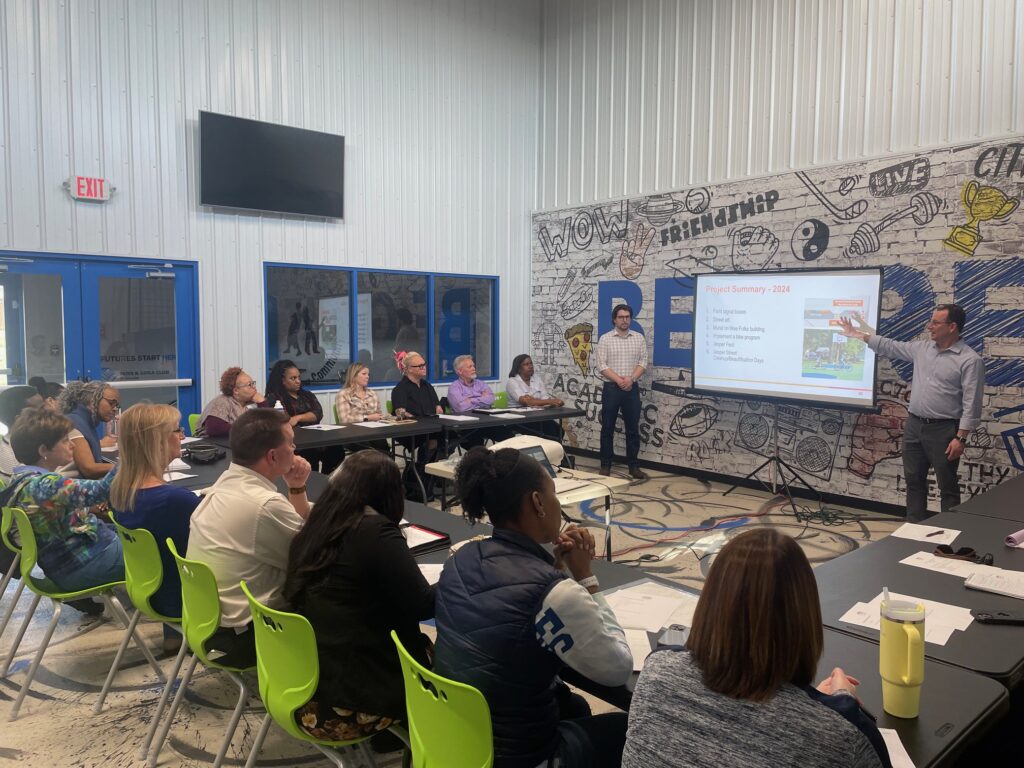
Capacity building team in the first site visit to Decatur, Illinois. Image Credit: SUMC
Following the in-person convening, the Capacity Building team spent the rest of the spring coordinating bi-weekly meetings of the JSIC Bicycle Programming Subgroup, while Teska Associates did the same with the Placemaking Subgroup. Through the Bicycle Programming Subgroup, the Capacity Building team helped coordinate and plan the Learn and Earn a Bike program. This work included developing documentation such as a sign-up sheet for the Boys and Girls Club to circulate to interested families with kids in their Summer Camp program, liability waivers modeled after existing activities at the Boys and Girls Club, and the learning program’s full curriculum.

Slide from Learn and Earn a Bike Curriculum, Summer 2024
Image Credit: SUMC
The curriculum was developed with advice from a League Certified Instructor (LCI) at SUMC with previous experience in similar programs in Ventura, California. These documents were used to secure commitments from the other partners, including the location in The Hope Academy and the instructors from the Decatur Bicycle Club.
Learn and Earn a Bike Program
In June 2024, the Capacity Building team returned to Decatur for a week to launch and support the inaugural class of the city’s Learn and Earn a Bike Program. Over four weeks, children aged 10-12 from the Boys & Girls Club of Decatur met twice a week with members of the Decatur Bicycle Club, learning bike safety and maintenance. The program concluded with a celebratory ride, where each student was awarded a certificate of completion along with their bike and helmet.
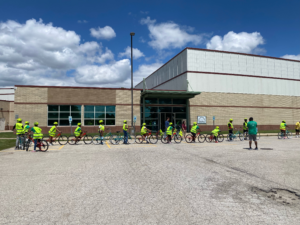
The Learn and Earn a Bike Program. Image Credit: SUMC
This program was developed in collaboration with several local organizations. The Boys and Girls Club included the Learn and Earn a Bike program in their 2024 summer camp, and its leaders participated as teachers. The Hope Academy, a public school adjacent to the Boys and Girls Club, hosted the program with indoor space for classroom learning, bike storage and a parking lot outside for outdoor practical learning. The Decatur Bicycle Club taught the program, and the Decatur Bicycle Shoppe provided the bikes at wholesale cost. Additionally, Decatur’s Department of Transportation provided an off-duty bus for the youth participants to learn how to place bikes on the rack and ride the bus.
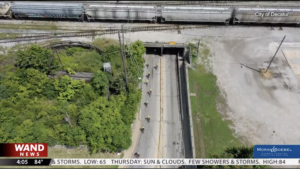
Aerial photo of the community ride on the final day of the Learn and Earn a Bike program, near the viaduct immediately South of The Hope Academy and the Boys and Girls Club of Decatur. Image Credit: WAND-TV
The program concluded with a graduation community ride featuring the participating kids, other residents, and other guests from the community, including members of Decatur Bicycle Club, a local jobs training group called EnRich, City of Decatur staff, and Decatur Police Department. The Learn and Earn a Bike program attracted attention from local news coverage, including WAND-TV (the local NBC affiliate, who also covered the final graduation ride), WCIA (the local CBS affiliate), NowDecatur.com (local radio broadcaster WSOY, 1340 AM), and Decatur’s Herald & Review paper.

The July 2024 community ride for the Learn and Earn a Bike Program. Image Credit: SUMC
In Spring 2025, the Learn and Earn a Bike program resumed with a week-long course for 19 additional Decatur children. The course was instructed by LCIs from the Decatur Bicycle Club, who taught participants critical bike safety and bike maintenance tips. In addition to the Decatur Bicycle Club and the Decatur Bicycle Shoppe, the Boys and Girls Club partnered with the Heart of Illinois Community Foundation, which supplied funding for the bicycles. The program concluded with a graduation ceremony for the children as they received their new bicycles.

Learn and Earn a Bike 2025 program participants. Credit: City of Decatur
Jasper Street Fest
On June 13th, 2024, the City of Decatur hosted another Jasper Street Fest at Johns Hill Magnet School in the Jasper Corridor, supported by members of the Capacity Building team, including SUMC and Teska Associates. Residents commented on and rated potential bike program ideas for the community and provided feedback on areas of the Jasper Corridor where they felt safe or unsafe to walk or bike around. Over 400 community members attended this most recent iteration of Jasper Street Fest, and their responses helped instill confidence in the direction of the capacity building team and the City of Decatur’s efforts towards realizing the goals set forth in the Jasper Roadmap.

SUMC Program managers Joey Juhasz-Lukomski and Pete Lauer gathering community feedback at the Jasper Street Fest 2024. Image credit: Teska Associates
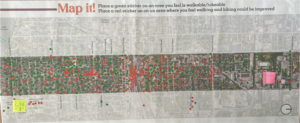
Results from the June, 2024 Jasper Street Fest community mapping exercise. Residents highlighted feeling especially unsafe by the viaduct underpass, which is immediately South of the Hope Academy and the Boys and Girls Club where the Learn and Earn a Bike program was held. Image Credit: Teska Associates
In addition to marking a map of the Jasper Corridor with green dots to show where they feel safe and red dots to show where they feel unsafe walking and biking, residents were also able to give feedback on bike programming strategies to encourage safe biking for all ages. The activities with the most votes were a potential off-street children’s bike track (44 votes) and youth programs (31 votes), while community rides (30 votes) and bike maintenance classes (20 votes) also received positive feedback. This community event also marked the first stage of painting a parking lot mural by Johns Hill Magnet School, located adjacent to Jasper Street. The Decatur Arts Council, part of the placemaking group in the JSIC, began this mural with the help of kids who attended the street fest.
Recognition for the Jasper Roadmap
Throughout this process, the City of Decatur was nominated for recognition by the American Planning Association’s Illinois Chapter (APA-IL). In September of 2024, the APA-IL announced that the City would be recognized for its work on the Jasper Roadmap with the 2024 Strategic Planning Award. This award demonstrates the thorough nature of Decatur’s community engagement process and the hard work of the entire team towards realizing the goals set forward by the Great Streets, Great Neighborhoods Initiative.
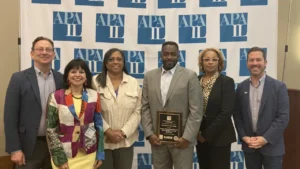
Decatur’s Department of Economic and Community Development and partners accept the Strategic Planning Award from the American Planning Association’s Illinois Chapter.
Image Credit: WCIA
League Cycling Instructor Training through League of American Bicyclists
The summer 2024 Learn and Earn a Bike program was seen as a success. Many residents expressed interest in a continuation of the program, or at least future programming to help residents learn to safely use bicycles on city streets. The League of American Bicyclists offered training in the fall of 2024 in Central Illinois for their LCI certification. This certification allows trainees to secure more resources for future bike programs such as curriculum, networking opportunities, and insurance for classes. TCP direct community support funds were used to send members of the Decatur Bicycle Club (two of whom helped lead the instruction of Decatur’s summer Learn and Earn a Bike program) along with the Community Liaison from SUMC to receive their LCI certification in September and October 2024.
The training included first participating in a one-day Smart Cycling course, which was held in Urbana, IL (roughly 55 miles from Decatur) on Saturday, September 7th, 2024. The class was taught by Cynthia Hoyle and Caryn Davis, both of whom are LCI Certified. The Smart Cycling course (formerly called “Traffic Skills 101”) serves as a baseline knowledge certification for cycling skills, designed so that people of all ages and abilities can improve their skills and build confidence biking on public roads. Smart Cycling is required as a prerequisite for all LCI candidates.
The LCI seminar was conducted in Normal, IL (roughly 50 miles from Decatur) on October 4-6, 2024. The class was taught by LCI Coach Elizabeth Adamczyk (LCI Coach is the certification for those who are able to teach LCI seminars). Before the class began, all candidates were required to take a pre-seminar exam and score at least 80% to determine familiarity with the material. Because the class took place over an entire weekend, TCP direct community support funding was used to support travel and lodging for the Decatur Bicycle Club members who taught the class.
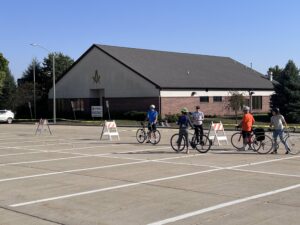
LCI candidates demonstrate and teach the parking lot drills on October 5, 2024 as part of the LCI Seminar. Image Credit: SUMC
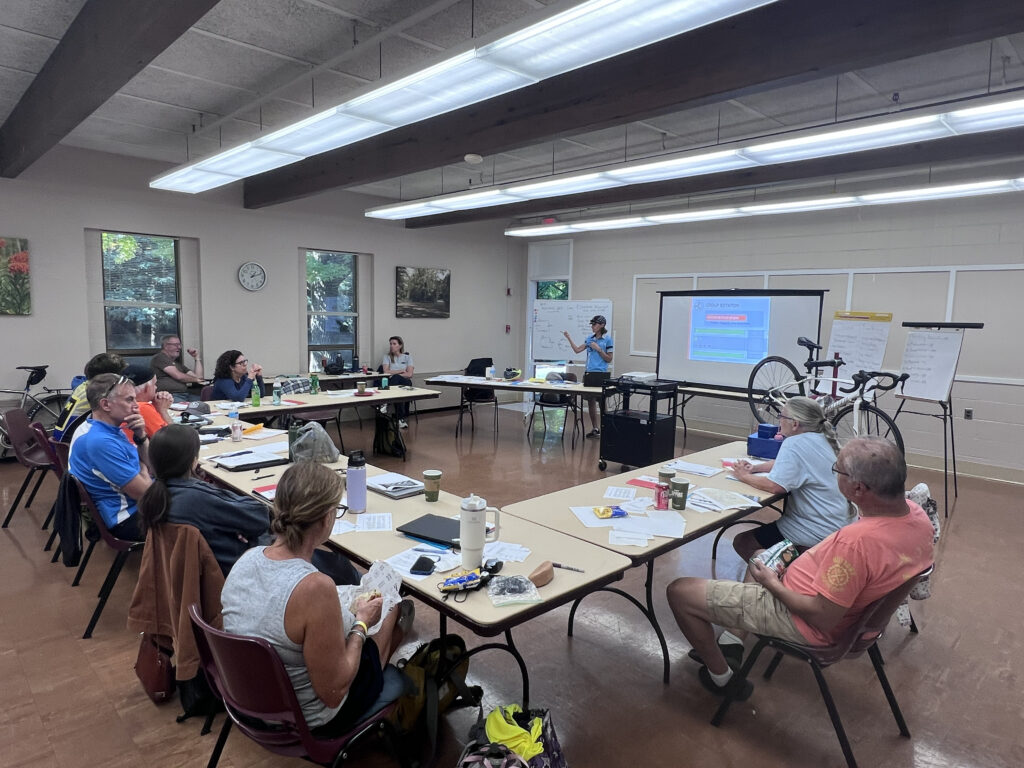
Elizabeth Adamczyk teaches the LCI seminar in Normal, IL on October 5th, 2024 Image Credit: SUMC
The scheduled program covered 24 hours of class and on-bike learning, and the content of the course was focused on not just an individual’s biking skills, but also the pedagogy required to teach those skills to all ages and ability levels. As part of the class, all LCI candidates were required to prepare and teach classroom modules from the Smart Cycling class and receive feedback from the rest of the candidates. In addition, all candidates needed to demonstrate the ability to set up, demonstrate, and teach the bicycle maneuvers in the parking lot drills taught within the Smart Cycling class.
Funding Support and Future Bike Programming
The Capacity Building team continues to work with the City of Decatur to coordinate local organizations and allocate direct support to programs within the city. In early 2025, these programs included additional single-day Learn-to-Ride clinics through the Boys and Girls Club and bicycle maintenance clinics through the Decatur Bicycle Shoppe, all of which benefited from TCP direct funding.
The City of Decatur applied to the 2023 Reconnecting Communities Program (RCP) and Rebuilding American Infrastructure with Sustainability and Equity (RAISE) grants, however, their project was not selected. The City of Decatur used direct funding from TCP to hire a grant writer to apply for a 2024 RCP and a 2024 RAISE grant, both of which would go towards planning and construction for infrastructure improvements along Jasper Street in line with the City’s Roadmap.
Some of these funds are also being allocated towards placemaking improvements on the Jasper Corridor, including painted crosswalks near the Johns Hill Magnet School and the completion of the parking lot mural in the same school, facing Jasper Street.
Sharing Lessons Learned
The Capacity Building Team is working to share insights and lessons learned from the work with Decatur through TCP at various conferences and forums. In May 2025, Capacity Builders presented on the Learn and Earn a Bike program at the Illinois Bike & Walk Summit. The Capacity Building Team also has plans to showcase TCP work with Decatur at the Transport Chicago conference in June 2025 and the Illinois Chapter of the American Planning Association State Conference in October 2025.
Related Resources
- Jasper Street Great Streets Great Neighborhoods
- Decatur City Council officially approves the Jasper Corridor Roadmap
- Coverage of the Learn and Earn a Bike program launch from WAND-TV, the local NBC affiliate
- Coverage of the Learn and Earn a Bike program from NowDecatur.com (WSOY)
- Coverage of the Learn and Earn a Bike program from the Herald and Review
Key Partners
- City of Decatur Department of Economic and Community Development: for the past 40 years, the City of Decatur has used this department to nurture a strong sense of community and help retain the city’s small-town character. For this project, the department coordinated the partner outreach in February-March 2024 before launching the Jasper Street Implementation Committee (JSIC). Additionally, they purchased bikes for the Learn-and-Earn-a-Bike program in the summer of 2024.
- Decatur Bicycle Club: cyclists serving Decatur, Illinois and surrounding Macon County areas through community outreach weekly rides and the Amish Country Bicycle Tour. Members of Decatur Bike Club served as instructors for the Learn and Earn a Bike program in summer 2024. Club members also participated in LCI certification training in autumn 2024, in order to lead future bike programming in and around Decatur.
- Decatur Bicycle Shoppe, a locally-owned bike shop, provided bikes at wholesale cost (with no profit) for the Learn and Earn a Bike program in the summer of 2024.
- Teska Associates is a contractor with the City of Decatur and leads JSIC for placemaking. The firm organized Jasper Street Fests in 2023 and 2024.
- Shared-Use Mobility Center (SUMC) is the Thriving Communities Program (TCP) subcontractor, and the Capacity Building team leads JSIC for Bicycle Programming. SUMC led coordination for the Learn and Earn a Bike program, helped launch the program in June 2024, supported Jasper Fest 2024, and participated in the July community ride and conclusion ceremony.
- Boys and Girls Club (BGC) of Decatur, IL is an afterschool program that has been a driving force behind childhood development and growth for over 45 years. They co-hosted the summer 2024 Learn and Earn a Bike Program, where the club encouraged kids and leaders to walk over to the Hope Academy from its Summer Camp.
- Hope Academy is a public K-8 school adjacent to the Boys and Girls Club. Built in 2005 in collaboration with the City of Decatur, it is located in the Wabash Crossing redevelopment area formerly known as Phoenix Park. The school co-hosted the summer 2024 Learn and Earn a Bike Program in their facilities and invited some current students at the Hope Academy to participate.
- Johns Hill Magnet School is also a public K-8 school along the Jasper Street Corridor which houses the District’s English Language Learners program. It has the longest history as a magnet school in Decatur.
- RMI is an independent, nonpartisan, nonprofit that transforms global energy systems through market-driven solutions to align with a 1.5°C future and secure a clean, prosperous, zero-carbon future for all. The nonprofit serves as prime contractor for TCP.
- Decatur Arts Council introduces and promotes the arts, enhances arts educational opportunities, and increases the impact of and access to the arts to improve the quality of life in the community. The council supports JSIC for placemaking and has coordinated work on a mural funded by TCP.
- The Heart of Illinois Community Foundation is a nonprofit organization based in Decatur that aims to build philanthropic resources to address community needs and improve the quality of life for central Illinois communities. The foundation provided funding for bicycles for the 2025 Learn and Earn a Bike Program.
Capacity building efforts in Decatur through the Thriving Communities Program are continuing through May 2025. The capacity building team will conduct more technical assistance activities and will update this case study as the program progresses.